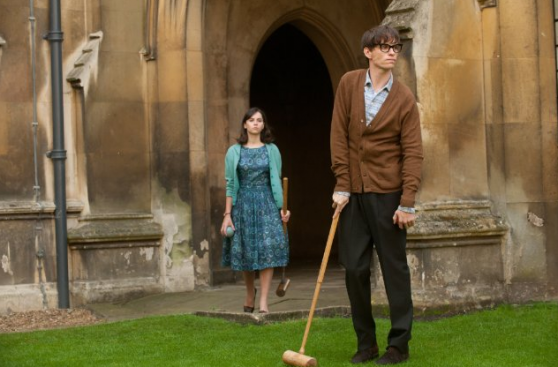17/31: The Theory Of Everything

Photo: Focus Features
The Theory Of Everything is too much “everything,” not enough “theory.”
And by “everything,” I mean that the movie is too general, too gentle, hitting all the filmic cliches of a story about a famous relationship — the fireworks, the montages — but shying away from anything fresh or difficult in the marriage of Stephen Hawking (Eddie Redmayne) and his first wife, Jane (Felicity Jones). Hawking’s incipient condition worries their families vis-a-vis the prospects for his and Jane’s marriage, as initially he’s given only two years to live, but they can and do have sex and children; we don’t see that, just a drunken dialogue with a friend about “automatic” physical systems and the occasional baby getting positioned in an increasingly compromised Hawking’s arms. Jane’s choir director Jonathan (Charlie Cox, in a series of regrettable wigs) clearly has a thing for Jane, and she for him, but then he kind of comes to live with them on vacation? It’s unclear from the umpteenth montage what the situation is, except that it’s not really appropriate and Hawking has to nearly die to put paid to it. (Until he falls in love with his speech therapist and frees Jane to go off and marry Jonathan after all.) (Oh, and that whole flap about Hawking’s family thinking their third child is Jonathan’s, but that never comes up again either.)
Jane’s in an exhausting and scary position as Hawking’s primary caretaker, and a few scenes hint at how she has to cross over from wife and partner to a more maternal role and how that might diminish Hawking socially, but because it’s sticky and complex, it’s soon glossed over; the same with Jane’s SAH claustrophobia. The kids’ shouting drives her nuts, she has to tote Hawking up and down the stairs, Mum tells her to join the choir, she does, Jonathan…happens, and we barely see the kids again until the final scene at the palace. Shouldn’t a film based on Jane’s memoirs have something more nuanced to say about life with a capital-G Great Man and intellect, never mind one with Hawking’s physical challenges? Shouldn’t we have a better sense of who she is given how hard she must have had to fight to learn it herself? Who is this movie really about?
It ends up kind of a trifling thing, The Theory Of Everything, because it tries to do everything, 30 years of a marriage, while mostly not doing anything we haven’t seen before, so the net effect is a bit TV-movie — except for Redmayne, who is everything. To an extent it’s mimicry, but the important bit is that fiery mad joy behind Hawking’s glasses, and Redmayne nails that. The actor has a lovely voice, and its withering here, then becoming the familiar electronic American we’ve all known for years, is a nice metaphorical pairing with Hawking’s own evolutions. But he throws a film that’s apparently Jane’s story all out of whack; Jones does the best she can, but your eye just goes right to him. Tell me a story about that, how that’s been for her. Put him offscreen or out of frame; find a different angle. Redmayne is really wonderful — his work in response to Jane’s sorrowful, determined “I have loved you” is something else, and by the end, the rewind effect almost seems earned thanks to him. But it’s a beautiful performance of a fascinating man, stuck in a by-numbers narrative. I’ve enjoyed director James Marsh’s documentaries, so it’s hard to say what happened here; I think the script just bets the wrong pony.
Tags: 31 Days 31 Films Charlie Cox Eddie Redmayne Felicity Jones James Marsh Jane Hawking movies Stephen Hawking The Theory Of Everything




